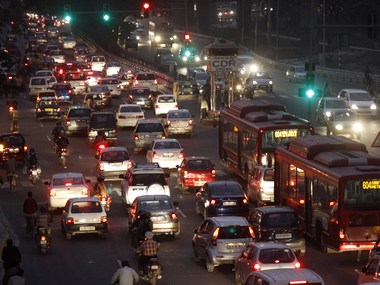A predominantly diesel portfolio even in the passenger car business has perhaps come to the rescue of Tata Motors in May, when petrol prices were hiked by more than Rs 7 across the country, leading to a sudden decline in petrol car purchases.
The country’s largest car maker, Maruti Suzuki India, saw sales of its entry level cars -M800, Alto, A-star and WagonR - decline by a whopping 29 percent; none of these models have a diesel option. In the same month, Tata’s Indica portfolio remained flat with a mere 1 percent decline (Indica mostly sells in diesel), while sales of the Nano (no diesel but highest fuel efficiency of all cars in India) were higher by a whopping 31 percent.
Clearly, the subdued overall buying sentiment, slowing economic growth and increased cost of operation of petrol cars have added to the industry gloom.
[caption id=“attachment_329333” align=“alignleft” width=“380” caption=“Reuters”]  [/caption]
To attract buyers, discounts on petrol cars remain at all-time high levels, with the Maruti Alto - the single largest selling car in India - coming for almost Rs 50,000 cheaper through discounts and freebies. Even the SX4 sedan, which has seen tough competition from Honda City (which recently became cheaper by Rs 60,000), and from new models such as Volkswagen Vento and Nissan Sunny, sold only 405 units this May against 2,702 units in the same month last year, an 85 percent decline.
Is Maruti looking to slash prices of the SX4 to get back into reckoning? Discounts on this car also total about Rs 30,000, even with a diesel option available. In addition, segment leader Honda City is only available with a petrol engine.
Impact Shorts
More ShortsEven the Omni and Eeco cars couldn’t hold their own, with sales down almost 30 percent. In May, Maruti sold 4.3 percent less in the domestic market at 89,478 units (93,519 units). Even exports were down by 11 percent to 9,406 units (10,554 units).
The company has already indicated it will reduce production of petrol cars by 50,000 units in the current financial year even as it adds 2.6 lakh diesel cars.
Meanwhile, Tata Motors’ passenger vehicle sales (cars, utility vehicles and vans) were 20,503 units, 6 percent growth over 19,401 units last May. Nano clocked 8,507 units (6,515 units); Indica range sales were 5,467 units (5,497 units); Indigo range sold 3,397 units, lower by 20 percent, over 4,268 units in last May. The Sumo/ Safari/ Aria/ Venture range sales were flat at 3,132 units.
Ford India’s sales fell 14 percent, while General Motors India reported a much steeper 27 percent slide in sales. GM sold 6,079 units (8,329 units); only 735 units of small car Spark were sold last month. The Beat (which now also has a diesel option) sold 4,110 units; entry-level sedan Aveo sold only 71 units; Optra, a mere 7 units and luxury sedan Cruze, just 188 units.
Another 946 units of multi-purpose vehicle Tavera and 22 units of sports utility vehicle Captiva were also sold. In this bleak scenario, will car makers meet the annual sales target set by the Society of Indian Automobile Manufacturers (SIAM) set at the beginning of the fiscal? SIAM has forecast 10-12 percent sales growth in the current financial year.


)

)
)
)
)
)
)
)
)



